| Srl | Item |
| 1 |
ID:
165593
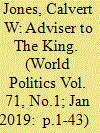

|
|
|
|
|
| Summary/Abstract |
Do experts rationalize and legitimize authoritarian governance? Although research on expert actors in contexts of democracy and international governance is now extensive, scholarly work on their role in authoritarian settings remains limited. This article helps open the black box of authoritarian decision-making by investigating expert advisers in the Arab Gulf monarchies, where ruling elites have enlisted them from top universities and global consulting firms. Qualitative fieldwork combined with three experiments casts doubt on both the rationalization and legitimacy hypotheses and also generates new insights surrounding unintended consequences. On rationalization, the evidence suggests that experts contribute to perverse cycles of overconfidence among authoritarian ruling elites, thereby enabling a belief in state-building shortcuts. On legitimacy, the experiments demonstrate a backfire effect, with experts reducing public support for reform. The author makes theoretical contributions by suggesting important and heretofore unrecognized conflicts and trade-offs across experts’ potential for rationalizing vis-à-vis legitimizing.
|
|
|
|
|
|
|
|
|
|
|
|
|
|
|
|
| 2 |
ID:
171035
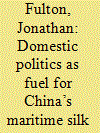

|
|
|
|
|
| Summary/Abstract |
China’s involvement with the Gulf monarchies has been built upon an economic foundation. With the Belt and Road Initiative (BRI) and the Maritime Silk Road Initiative (MSRI) this has expanded, as the Gulf monarchies see cooperation with China through MSRI projects as a means of advancing economic development programs necessary to move beyond single-resource rentier economies and relationships with external powers as a means of ensuring their security in an unstable region. This has important implications for the shape of the MSRI as a whole, and how it fits together with the larger BRI. China’s BRI/MSRI success with participating states will be a matter of matching their specific domestic needs and strategic considerations with Chinese perceptions of the relative importance of those states.
|
|
|
|
|
|
|
|
|
|
|
|
|
|
|
|
| 3 |
ID:
132345
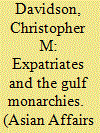

|
|
|
|
|
| Publication |
2014.
|
| Summary/Abstract |
For many years huge expatriate populations have played a much documented role in the economic development of the Gulf monarchies. But a less well-told story is how expatriates have also contributed to their political stability. As non-citizens their presence in such large numbers has reinforced the elite status of most citizens in the region - an important non-pecuniary legitimacy resource for the various ruling dynasties. Moreover, the primarily employment-driven status of expatriates has meant that they have usually adopted either an apolitical or even prostatus quo stance. In some cases their perceived loyalty has led to selective naturalization or even direct co-option into security services. Disrupting this decades-old relationship, however, have been the recently changing political and economic circumstances of the Gulf monarchies. Already decisions have been made to reduce significantly expatriate populations due to accumulating pressures. Such measures are likely to threaten the historic political advantages the presence of expatriates has provided for these polities.
|
|
|
|
|
|
|
|
|
|
|
|
|
|
|
|
| 4 |
ID:
176572
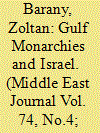

|
|
|
|
|
| Summary/Abstract |
The relationship between most of the Gulf monarchies and Israel has improved in recent years. This article argues that four fundamental reasons account for the shift in Gulf leaders' attitudes: growing alignment of geopolitical interests against Iran, failings of American Middle East policy, recognition of the potential economic benefits of détente, and attitudinal shifts about the Palestinian cause. While this trend is present nearly throughout the Gulf, individual states' evolving nexuses to Israel underscore the divergences in their foreign policies.
|
|
|
|
|
|
|
|
|
|
|
|
|
|
|
|
| 5 |
ID:
117396
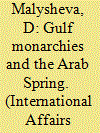

|
|
|
|
|
| Publication |
2012.
|
| Summary/Abstract |
THE HIGH WAVE of social and political protest in the Middle East and North Africa raised by mainly domestic discontent gave all sorts of external forces a chance to channel anti-government riots in the desired direction. The Gulf monarchies or, to be more exact, the "Wahhabi tandem"1 of Saudi Arabia and Qatar moved, for the first time in their history, onto the world arena; they joined forces with the West and tapped to the full their financial, military, political and information resources to make the Persian Gulf a geopolitical center in its own right in the Middle East and the Arab world.
|
|
|
|
|
|
|
|
|
|
|
|
|
|
|
|
| 6 |
ID:
148065
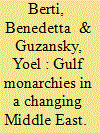

|
|
|
|
|
| Summary/Abstract |
More than three after the beginning of the Arab Awakening, it appears that the upheavals have, by and large, left the Gulf monarchies intact. While several dictators have fallen— from Ben Ali in Tunisia, Mubarak in Egypt and Gaddafi in Libya to Saleh in Yemen— monarchies across the region have shown considerable survival skills. But is this purported resilience likely to last even as the Arab Awakening continues to shake the Middle East and North African (MENA) region, or are the monarchs next in line now that the “presidents for life” have met their demise? This article explores the various ways in which Gulf monarchies have experienced political and social mobilizations associated with the Arab Awakening and then analyzes the characteristics that have allowed these countries to weather the storm, focusing on both pre-existing structural and cultural factors, as well as political responses to the unfolding regional protests.
|
|
|
|
|
|
|
|
|
|
|
|
|
|
|
|
| 7 |
ID:
177205


|
|
|
|
|
| Summary/Abstract |
This introduction outlines how the fragmentation of the Middle East state system, coupled with the shifts in the centrality of oil to the well-being of the Global economy, has now recast debates about the very nature of energy security and the future stability of the Gulf monarchies. Acting as a primer to the articles that comprise this special section of Journal of Arabia Studies, it highlights many of the attendant security issues surrounding energy diversification strategies now being adopted by many of the regions actors, while also highlighting the key differences that have shaped the responses of the individual Gulf monarchies to the challenges they now face in an ever more uncertain era.
|
|
|
|
|
|
|
|
|
|
|
|
|
|
|
|